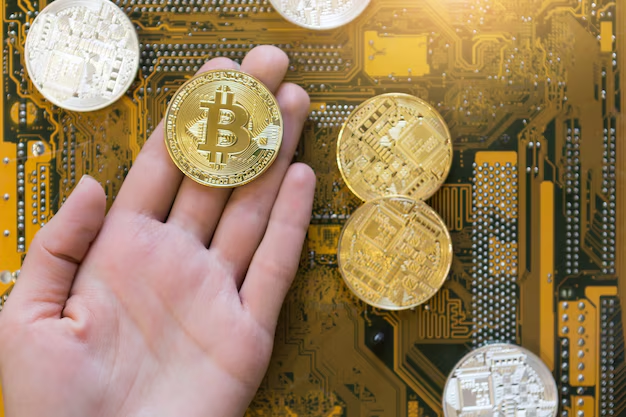Unlocking the Mysteries of Bitcoin: What Does Bitcoin Mean?
In a world buzzing with digital transformation, Bitcoin often stands out as a symbol of the future of money. Yet, for many, it remains an enigma wrapped in layers of tech-savvy terminology. Ever wondered, "What does Bitcoin mean?" You're not alone. This digital currency has prompted financial revolutions, heated debates, and a myriad of innovations. Let's venture into the world of Bitcoin and uncover its significance, influence, and the potential future it holds.
🌟 What Is Bitcoin?
At its core, Bitcoin is a type of cryptocurrency—a digital or virtual form of money that relies on cryptography for security. Unlike traditional currencies issued by governments (such as dollars, euros, or yen), Bitcoin is decentralized. This means it operates without a central authority, utilizing a technology called blockchain to validate transactions.
Blockchain: The Backbone of Bitcoin
Blockchain is a distributed ledger technology that records all Bitcoin transactions across a multitude of computers. This ensures that the data is secure and transparent, making it nearly impossible to alter past transactions. Each block in the chain represents a group of transactions and is continuously updated and synchronized across all participants in the network.
The Genesis of Bitcoin
The enigmatic figure Satoshi Nakamoto, whose true identity remains unknown, conceived Bitcoin in 2008 amidst a global financial crisis. Nakamoto's vision was to create a currency that didn't depend on trust in banks or governments, but rather on mathematical principles and computational consensus.
How Does Bitcoin Work?
Bitcoin's functionality can be boiled down to several key elements:
- Transactions: Bitcoin transactions involve transferring Bitcoin from one address to another on the blockchain.
- Miners: These are participants who validate and record transactions on the blockchain. Miners solve complex mathematical puzzles to verify transactions, a process known as "mining."
- Wallets: Bitcoin is stored in digital wallets, each with a unique address that enables users to send and receive bitcoins.
🏦 The Impact of Bitcoin on the Financial World
Bitcoin has undoubtedly made waves in the financial sector. Its introduction challenged traditional banking systems and offered an alternative view of how value can be exchanged:
A New Paradigm: Decentralization
One of Bitcoin's most revolutionary aspects is its decentralization. By eliminating intermediaries like banks, Bitcoin empowers users to have direct control over their funds, enhancing personal freedom and privacy.
Financial Inclusion
Bitcoin offers a lifeline for the unbanked. In regions where traditional banking infrastructure is scarce, Bitcoin provides access to financial services, enabling users to participate in the global economy easily.
Investment Vehicle
Over the years, Bitcoin has emerged as a speculative investment. Its value can be extremely volatile, yet it has attracted investors worldwide, creating buzz as a potential store of value similar to gold.
⚖️ Regulatory Landscape: Navigating the Legalities
As Bitcoin gains popularity, governments and regulatory bodies are continually updating their frameworks:
Legal Recognitions and Challenges
While some countries have embraced Bitcoin, regulating it as a commodity or foreign currency, others have banned it outright. This disparity reflects the ongoing global debate about how to handle cryptocurrencies.
Tax Implications
For users and investors, understanding tax obligations is crucial. In several jurisdictions, Bitcoin is subject to capital gains tax, meaning any profit realized from its sale is taxable.
🔍 Understanding Bitcoin's Volatility
Bitcoin's price can skyrocket or plummet within a short period. But why is Bitcoin so volatile?
Market Speculation
Bitcoin’s price is significantly influenced by market sentiment and speculation. Headlines about regulatory developments, hacker attacks, or high-profile endorsements can trigger vast price swings.
Limited Supply
Bitcoin's supply is capped at 21 million coins, creating a scarcity that can drive demand (and thus volatility) as it nears this limit.
💡 The Future of Bitcoin: Trends and Possibilities
What lies ahead for Bitcoin? While predictions vary, several key trends offer insights:
- Adoption: As more businesses and individuals embrace Bitcoin, its use as both a payment medium and investment is likely to grow.
- Scalability Solutions: Technologies like the Lightning Network seek to improve Bitcoin's transaction speed and efficiency, making it more viable for everyday transactions.
- Integration with Traditional Finance: Increasingly, financial institutions are integrating Bitcoin into mainstream products, like ETFs or retirement funds, signaling growing acceptance.
📌 Key Takeaways
- Bitcoin is a decentralized cryptocurrency that operates independently of central banks.
- Blockchain technology underpins Bitcoin, ensuring secure and immutable transactions.
- Its role as an investment vehicle continues to intrigue investors, despite volatility.
- Global regulations around Bitcoin remain varied, highlighting the ongoing debate in financial communities.
- The future of Bitcoin looks promising with increased adoption and technological advancements.
🤔 Should You Consider Bitcoin?
While Bitcoin represents an exciting frontier in digital finance, it requires caution and understanding. Those venturing into the Bitcoin space should consider personal circumstances, risk tolerance, and remain informed about evolving regulations and technologies.
🔍 Summary at a Glance:
- 🔗 Decentralization: Bitcoin empowers users with direct control over their money.
- 🌍 Financial Inclusion: Offers financial access where traditional systems fail.
- 📈 Investment Speculation: Know the risks and potentials in Bitcoin investments.
- 📜 Regulatory Variability: Stay updated on legal perspectives within your jurisdiction.
- 🚀 Future Prospects: Adoption, scalability, and integration with finance to enhance Bitcoin's role.
Venturing into Bitcoin is not just about financial gain; it signals participating in a transformative era for money and technology. As you explore, remain curious, informed, and cautious. Bitcoin's journey is a collective experiment reshaping the world's approach to currency and finance.

